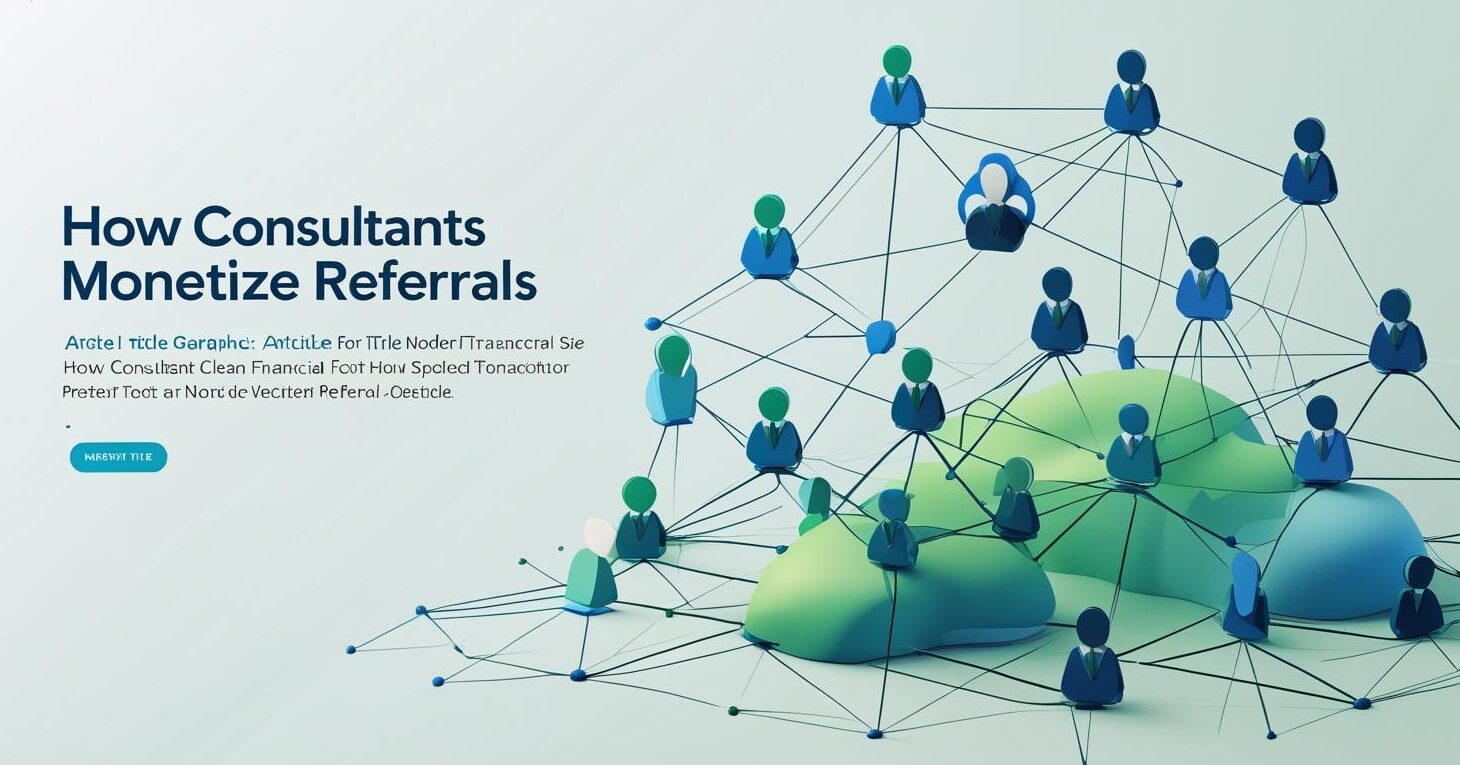Referral programs have become an effective tool for consultants who want to grow their business and create new revenue streams. When implemented with intention, these programs not only bring in new clients but also strengthen relationships with trusted partners and professional networks. For consultants, the right referral strategies can mean less time chasing cold leads and more time focused on high-value relationships that convert.
This guide outlines how consultants monetize referrals to increase profitability and build sustainable client pipelines. It covers what makes a referral network effective, the different ways to structure compensation, and how to nurture referrals into long-term business. Whether you’re an independent consultant or part of a larger consulting firm, aligning your referral efforts with a practical strategy can significantly impact your growth.

Why Referral Partnerships Are a Game-Changer for Consultants
Referral partnerships help consultants get in front of potential clients through trusted introductions. Instead of relying solely on cold outreach or expensive ad campaigns, consultants who form strong partnerships can tap into the networks of others who already have client trust.
These relationships often work through informal or formal agreements. In some cases, a partner sends business without expecting compensation. In others, a referral agreement sets expectations around commission or other rewards. Regardless of the setup, what matters most is mutual trust and value.
For consulting firms like P3 Cost Analysts, referral partnerships are more than a sales tactic. They’re a foundational part of business development. When clients or contacts refer new business, it signals that the consultant has already built a level of credibility worth sharing. This is especially valuable in industries where trust is difficult to earn and where long-term contracts are common.
Referral partnerships can also create a flywheel effect. One successful client experience leads to a referral, which can lead to another, and the cycle continues. By focusing on relationships and shared wins, consultants create a consistent stream of warm leads that are far more likely to convert.
Building a High-Value Referral Network
Creating a reliable referral network takes more than asking for leads. It starts with building strong professional relationships and maintaining visibility. Consultants who consistently show their value, follow through on their promises, and communicate clearly are more likely to stay top-of-mind when referral opportunities come up.
A strong referral network often includes:
-
Former clients who had positive experiences
-
Industry peers with non-competing services
-
Professional associations or member groups
-
Vendors, suppliers, or partners with shared audiences
-
Influential individuals in related fields (e.g., attorneys, accountants, brokers)
To expand this network, consultants need to regularly engage with contacts. This could include staying active on LinkedIn, attending industry events, or participating in peer mastermind groups. Consultants can also use newsletters or one-on-one catchups to remind contacts of their offerings.
More importantly, consultants should make it easy for others to refer them. That means providing a simple explanation of services, ideal client profiles, and any rewards they may offer. When referrers understand the value a consultant brings, they are more confident in making introductions.
Educating potential referrers, especially past clients, can be one of the most effective strategies. When people know the outcomes of your work and the type of problems you solve, they’re more likely to introduce you to others.
Effective Strategies for Monetizing Referrals
There are several ways consultants monetize referrals, and the most effective method often depends on the consultant’s business model and client value.
Common monetization strategies include:
-
Referral fee: A flat fee paid for each referred client that signs on.
-
Finder fee: A one-time commission paid after a closed deal.
-
Revenue share: A percentage of the revenue earned from the referred client.
-
Tiered incentives: Different rewards based on the size or duration of the referred contract.
Below is a comparison of referral models:
| Referral Model | Description | Best Use Case |
|---|---|---|
| Flat Referral Fee | Set amount paid for each closed referral | Short-term or low-ticket consulting |
| Finder Fee | One-time percentage of contract value | Project-based engagements |
| Revenue Share | Ongoing share of revenue from referred client | Long-term contracts or retainer work |
| Tiered Incentives | Higher rewards for higher value referrals | Programs looking to scale referrals |
When setting up a referral structure, consultants should be clear and upfront about how the arrangement works. A written referral agreement helps avoid misunderstandings. This document should include:
-
What counts as a qualified referral
-
How and when payments are made
-
Responsibilities of both parties
-
Duration of the agreement
Transparency builds trust and encourages referrers to continue participating.
Best Practices for Referral Compensation
Consultants should approach referral compensation with fairness, clarity, and consistency. The way a referral partner is rewarded can influence not only whether they continue referring but also the quality of referrals they send.
Best practices include:
-
Offer competitive rates: Match or exceed what others in your niche offer.
-
Be clear about timing: Explain when payments are made and under what conditions.
-
Acknowledge effort: Even if a referral doesn’t convert, a simple thank-you goes a long way.
-
Make payments promptly: Delays can damage trust.
-
Review agreements regularly: Update terms as your business evolves.
Another useful approach is to tie referral compensation to the quality and volume of business. For example, giving a higher rate for enterprise-level deals or recurring client contracts helps incentivize high-value referrals.
Referral tracking tools can help automate this process. Platforms like PartnerStack, Referral Rock, or even custom spreadsheets can log who sent what, when payments are due, and which leads converted.
When consultants treat referral compensation as part of their professional brand, they build a reputation for fairness and reliability. Those are two factors that drive ongoing interest in their programs.
How to Nurture and Convert Every Referral
Receiving a referral is only the beginning. How that lead is handled determines whether it becomes a closed deal and whether the referrer feels good about sending the next one.
Consultants should act quickly and professionally when a referral is received. That includes reaching out promptly, clearly explaining services, and ensuring the onboarding experience is smooth. Any sign of confusion or delay can erode trust.
Communication is also important with the referrer. Let them know when you’ve contacted the lead, share updates on the outcome (when appropriate), and express appreciation for the introduction.
Consider this simple process for referral follow-through:
-
Acknowledge the referral: Send a thank-you note or message right away.
-
Respond to the lead: Make contact within 24–48 hours.
-
Provide a quality consultation: Focus on value, not hard selling.
-
Update the referrer: Let them know the outcome.
-
Reward the referral (if applicable): Send payment, gift, or acknowledgment.
Consultants can also keep past clients engaged by offering loyalty perks, sharing case studies, and checking in periodically. A client who had a great experience and feels remembered is far more likely to refer again.
In cases where a referral doesn’t lead to new business, follow up with the referrer anyway. Ask for feedback: what was the lead expecting, and how could you have better met their needs? These insights help improve the referral process over time.
Grow Revenue with Smarter Referral Systems
Consultants who treat referrals as a business strategy, rather than something that happens by chance, are better positioned for long-term success. Referral programs bring in qualified leads, improve client trust, and strengthen partner relationships.
By setting up clear referral structures, offering fair compensation, and staying in touch with both clients and referrers, consultants can build predictable pipelines that support their business goals.
If your organization is ready to expand through a smarter referral strategy, reach out to P3 Cost Analysts. Our team works closely with consultants, partners, and businesses to identify savings, improve systems, and generate new revenue opportunities. Contact us today to learn how we support consultants in building referral programs that truly work.



